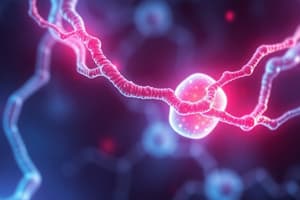Podcast
Questions and Answers
Which of the following are regarded as agonists for kainate receptors?
Which of the following are regarded as agonists for kainate receptors?
- NMDA
- PCP
- Domoic acid (correct)
- BMAA
What is a characteristic feature of AMPA and Kainate receptor subunit mutations?
What is a characteristic feature of AMPA and Kainate receptor subunit mutations?
- They always lead to epilepsy.
- They enhance synaptic plasticity.
- They only affect GluD subunits.
- They are linked to conditions like mental retardation. (correct)
Which ions can kainate receptors primarily allow to pass through?
Which ions can kainate receptors primarily allow to pass through?
- Na+ and K+ (correct)
- Only Ca2+
- Mg2+ and Na+
- Ca2+ and Cl-
Which of the following substances acts as a channel blocker for NMDA receptors?
Which of the following substances acts as a channel blocker for NMDA receptors?
What potential risks are associated with excessive activation of glutamate receptors?
What potential risks are associated with excessive activation of glutamate receptors?
Which of the following subunits are part of the NMDA receptor?
Which of the following subunits are part of the NMDA receptor?
What is required for the activation of the NMDA receptor?
What is required for the activation of the NMDA receptor?
What role does Mg2+ play in the function of the NMDA receptor?
What role does Mg2+ play in the function of the NMDA receptor?
What effect does ketamine have on the NMDA receptor?
What effect does ketamine have on the NMDA receptor?
Which of the following is NOT an agonist for AMPA receptors?
Which of the following is NOT an agonist for AMPA receptors?
Which receptor subunit mutation is associated with focal epilepsy?
Which receptor subunit mutation is associated with focal epilepsy?
What is the primary effect of amantadine at NMDA receptors?
What is the primary effect of amantadine at NMDA receptors?
Which property distinguishes AMPA receptors from NMDA receptors?
Which property distinguishes AMPA receptors from NMDA receptors?
What is the primary functional role of L-Glutamate in the central nervous system?
What is the primary functional role of L-Glutamate in the central nervous system?
Which receptor type is NOT classified as an ionotropic glutamate receptor?
Which receptor type is NOT classified as an ionotropic glutamate receptor?
What is the structure of ionotropic glutamate receptors?
What is the structure of ionotropic glutamate receptors?
Which subunit is NOT part of the NMDA receptor?
Which subunit is NOT part of the NMDA receptor?
What can sodium valproate stimulate?
What can sodium valproate stimulate?
What ion permeability is associated with AMPA receptors?
What ion permeability is associated with AMPA receptors?
What is a key action of Ketamine at NMDA receptors?
What is a key action of Ketamine at NMDA receptors?
What physiological process is mediated by ionotropic glutamate receptors?
What physiological process is mediated by ionotropic glutamate receptors?
Which of the following statements is correct regarding the types of ionotropic glutamate receptors?
Which of the following statements is correct regarding the types of ionotropic glutamate receptors?
Which of the following ions does NOT penetrate the NMDA receptor?
Which of the following ions does NOT penetrate the NMDA receptor?
Flashcards are hidden until you start studying
Study Notes
Ionotropic Glutamate Receptors
- Ionotropic glutamate receptors are a type of ligand-gated ion channel receptor.
- They are responsible for mediating excitatory neurotransmission in the central nervous system.
- There are three main types of ionotropic glutamate receptors: NMDA, AMPA, and kainate.
- These receptors are tetramers, meaning they are composed of four protein subunits.
- They can be either homo-oligomers (AMPA receptors) or hetero-oligomers (NMDA, kainate receptors).
NMDA Receptors
- Composed of GluN1, GluN2A, GluN2B, GluN2C, GluN2D, GluN3A and GluN3B subunits.
- Agonists include glutamate and NMDA.
- Permeable to Na+, K+ and highly permeable to Ca2+.
- Require binding of both glutamate and the co-agonist glycine for activation.
- The channel of the NMDA receptor is normally blocked by Mg2+.
- Following membrane depolarisation the Mg2+ ions are removed and the channel is able to conduct.
Drugs Targeting NMDA Receptors
- Ketamine: Open channel blocker at the NMDA receptor. Used in the induction and maintenance of anaesthesia.
- Amantadine: Antiviral used to treat influenza, but also acts as a channel blocker at NMDA receptors. Indicated for treatment of Parkinson’s disease.
AMPA Receptors
- Composed of GluA1, GluA2, GluA3 and GluA4 subunits.
- Agonists: glutamate and AMPA.
- Kainate and domoic acid have low potency at AMPA receptors.
- Permeable to Na+ and K+ with little permeability to Ca2+.
Kainate Receptors
- Expressed as homo-oligomers of GluK1, GluK2 or GluK3 subunits.
- GluK1-3 subunits can assemble into hetero-oligomers.
- Agonists: glutamate, kainate and domoic acid.
- Permeable to Na+ and K+ with little permeability to Ca2+.
GluD1 and GluD2
- "Orphan" receptor subunits.
- Ligand not confirmed.
- May be involved in synaptic plasticity.
Drug Targets: AMPA, Kainate and NMDA Receptors
- Excitotoxicity: rise in intracellular Ca2+ from glutamate receptor activation.
- Neurotoxins: glutamate analogues domoic acid β-N-oxylaminoalanine (BOAA) and β-N-methylamino-L-alanine (BMAA).
- Ischaemic neuronal death: mediated by NMDA and AMPA receptors.
- PCP and ketamine are channel blockers for NMDA receptors.
- Mutations of glutamate receptors are associated with epilepsy.
Domoic Acid Poisoning
- Domoic acid is a neurotoxin produced by the algae Pseudo-nitzschia.
- It can accumulate in shellfish, specifically mussels.
- Consumption of contaminated shellfish can lead to domoic acid poisoning.
Studying That Suits You
Use AI to generate personalized quizzes and flashcards to suit your learning preferences.




